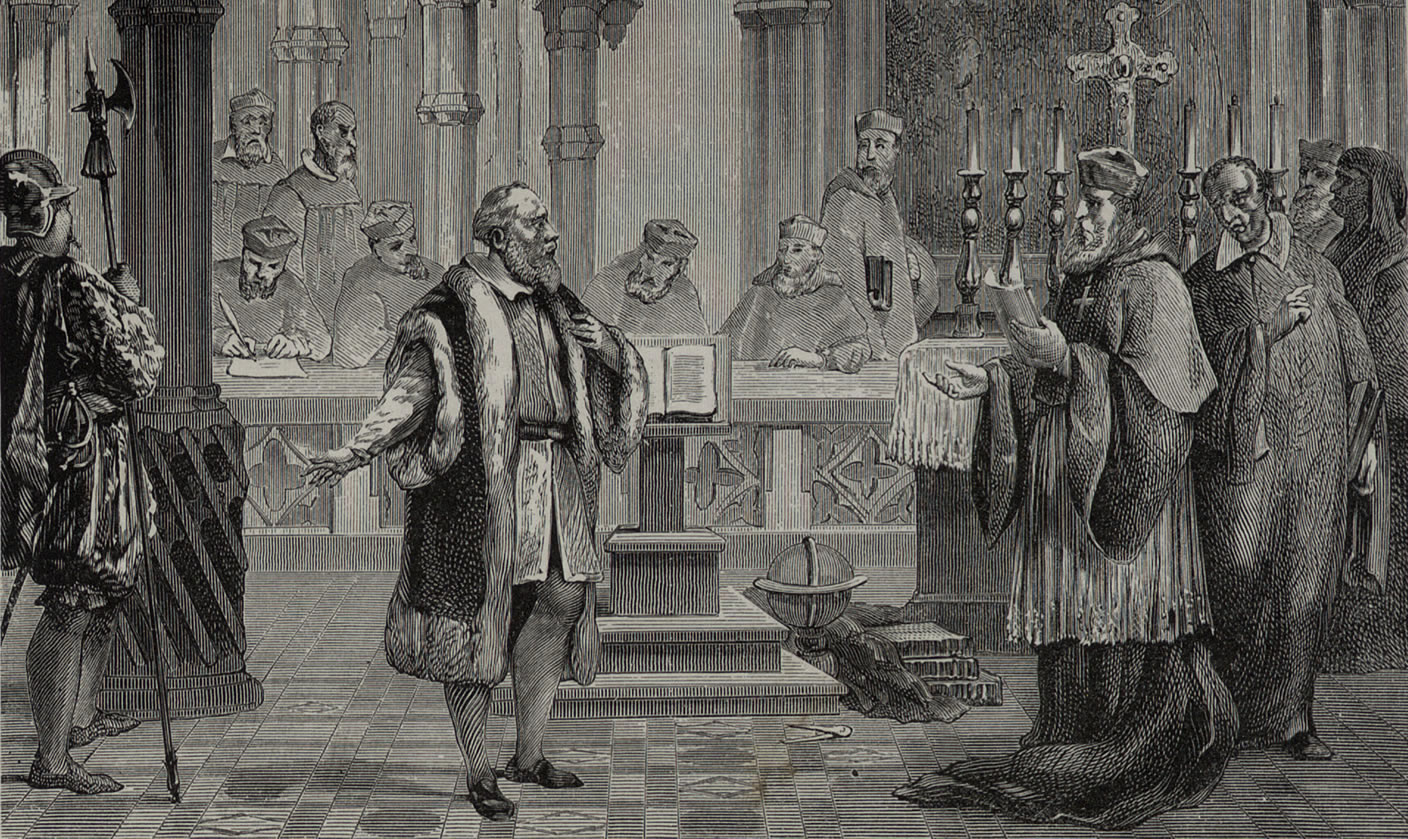The trial

Date | Event |
|---|---|
| 21.02.1632 | Printing is stopped of the Dialogue concerning the two chief world systems, the Ptolemaic and the Copernican. |
| 25.07.1632 | Father Riccardi writes to the Florentine inquisitor asking him to prohibit dissemination of the Dialogue. |
| 23.09.1632 | The Pope orders Galileo to present himself in Rome in October. |
| 17.12.1632 | Galileo receives a certificate, signed by three doctors, stating that he is unable to make the journey "due to an obvious and imminent danger to his life". |
| 30.12.1632 | The Pope threatens Galileo that, if he does come to Rome immediately, he will be fetched by a commissioner, accompanied by doctors, and if necessary taken to the Holy Office's prison in chains. |
| 20.01.1633 | Galileo finally makes the journey and arrives in Rome on the evening of 13 February – after a spell in quarantine due to the raging plague. He is allowed to be detained in the Tuscan embassy rather than in the Holy Office's prison. |
| 12.04.1633 | He surrenders to the Holy Office and is interrogated for the first time. |
| 30.04.1633 | He confesses to "errors" and expresses his willingness to add two more days to the Dialogue (but nothing in fact comes of this) in which he will refute Copernican theory. |
| 21.06.1633 | He surrenders once again to the authorities of the Holy Office for further interrogation. This time he is detained. |
| 22.06.1633 | He is taken to the great hall of the Dominican Convent of Santa Maria sopra Minerva where the formal judgment (imprisonment and prohibition of the Dialogue) is read out to him. Galileo then recants. |
| 30.06.1633 | The Pope allows Galileo to go to the archbishopric of Siena. |
| 01.12.1633 | The Pope grants Galileo lifelong house arrest in Galileo’s own country house in Arcetri near Florence. |
"I, Galileo Galilei, son of the late Vincenzo Galilei, Florentine, aged seventy years, arraigned personally before this tribunal, and kneeling before you, Most Eminent and Reverend Lord Cardinals, Inquisitors-General against heretical depravity throughout the entire Christian commonwealth, having before my eyes and touching with my hands, the Holy Gospels, swear that I have always believed, do believe, and by God's help will in the future believe, all that is held, preached and taught by the Holy Catholic and Apostolic Church.
But whereas – after an injunction had been judicially intimated to me by this Holy Office, to the effect that I must altogether abandon the false opinion that the Sun is the centre of the world and immovable, and that the Earth is not the centre of the world, and moves, and that I must not hold, defend or teach in any way whatsoever, verbally or in writing, the said false doctrine, and after it had been notified to me that the said doctrine was contrary to Holy Scripture – I wrote and printed a book in which I discuss this new doctrine already condemned, and adduce arguments of great cogency in its favour, without presenting any solution of these, and for this reason I have been pronounced by the Holy Office to be vehemently suspected of heresy, that is to say, of having held and believed that the Sun is the centre of the world and immovable, and that the Earth is not the centre and moves: Therefore, desiring to remove from the minds of your Eminences, and of all faithful Christians, this vehement suspicion, justly conceived against me, with sincere heart and unfeigned faith I abjure, curse and detest the aforesaid errors and heresies, and generally every other error, heresy and sect whatsoever contrary to the said Holy Church,
and I swear that in the future I will never again say or assert, verbally or in writing, anything that might furnish occasion for a similar suspicion regarding me; but that should I know any heretic, or person suspected of heresy, I will denounce him to this Holy Office, or to the Inquisitor or Ordinary of the place where I may be.
Further, I swear and promise to fulfil and observe in their integrity all penances that have been, or that shall be, imposed upon me by this Holy Office. And, in the event of my contravening (which God forbid) any of these my promises and oaths, I submit myself to all the pains and penalties imposed and promulgated in the sacred canons and other constitutions, general and particular, against such delinquents. So help me God, and these His Holy Gospels, which I touch with my hands. I, the said Galileo Galilei, have abjured, sworn, promised and bound myself as above; and in witness of the truth thereof I have with my own hand subscribed the present document of my abjuration, and recited it word for word at Rome, in the Convent of Minerva, this twenty-second day of June 1633. I, Galileo Galilei, have abjured as above with my own hand."
"I will draw all my attention to these monsignori, bishops and prelates who come under my nunciature so that the condemnation and abjuration of Galileo Galilei is published and also duly noted by them. I will execute this with as much zeal, piety and justice as the Sacred Congregation has applied. His admonition and penance makes the extent of the crime clear and will undoubtedly serve as an example to others not to commit similarly serious errors. In conclusion, I show your eminence my most submissive testimonial. To your eminence the most submissive, most loyal and very committed servant Ranuccio, Bishop of S. Donnino. The noble Cardinal S. Onofrio. Rome. Lucerne."